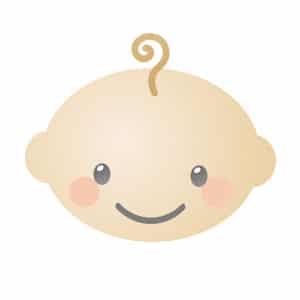Last updated on August 19th, 2022 at 11:11 pm
Trying to get up to date on all this BPA talk popping up in the news? Just saw a report on the local or national news? Hearing mixed information from friends? Ahh, we feel your mounting frustration from here. Before you get that huge trash bag and barrel through your kitchen like a sleep-deprived maniac, read this. Safe Mama is all about efficiency.
We know you parents are tired and need the quick and dirty version regarding BPA, so here you go:
What is BPA?
BPA or Bisphenol-a is a chemical used mostly in polycarbonate plastics (PC) and metal cans lining. It can be found in sports bottles, canned food (lining), soda cans, foil seals, and jar food lids. Great. (feel my thick sarcasm?)
How do I know if something plastic is made with Polycarbonate plastic (PC)?
Flip the item over and look for a recycling symbol on the bottom. It looks like a triangle of arrows with a number between 1 – 7 in the center. Polycarbonate plastic is usually marked with a 7. It might sometimes have a PC next to it indicating polycarbonate. However, not ALL #7 plastics are PC…
Why should I avoid BPA?
Bisphenol-a is a known endocrine disruptor. Meaning it has estrogenic properties, which, in recent animal tests, has shown to cause a bevy of health problems such as:
-
-
- precancerous tumors
- urogenital abnormalities in male babies,
- a decline in semen quality in males,
- early onset of puberty in females,
- Disrupts cancer treatments
- Connected to brain function and mood disorders in monkeys
- Heart disease
- Diabetes
- Metabolic Syndrome
- Impairs brain function and could lead to memory loss, learning difficulties, and depression.
-
Research shows that plastic containers, mostly those used to hold liquids and foods, are leeching Bisphenol into the foods and liquids they hold. Heating food and liquids with these plastics are shown to increase the leaching of this contamination. It has also been proven that BPA leaches into liquids from metal can linings (such as prepared baby formula) Bottom line: It’s icky, and if you don’t want to chance it on your precious kids, there are ways to avoid it.
Do My Baby Bottles Have BPA?
The United States passed a Federal law in 2012 banning BPA from baby bottles and sippy cups. BUT keep in mind that does not include things products like baby teethers. When purchasing baby bottles and sippy cups use reputable companies that follow the law.
List of States With Laws Protecting Consumers from BPA exposures
Currently, only 16 states have laws in place to help protect consumers from BPA. Some laws are newer, and others are adapted policies. Read the specific laws for your state; many laws are vague and only cover a small range of products. I urge you to use Safer States to learn more about what your state is doing. Also, as mentioned above, the Federal government banned BPA from baby bottles and sippy cups.
- California
- Connecticut
- Deleware
- Illinois
- Maine
- Maryland
- Massachusetts
- Minnesota
- Nevada
- New York
- Oregon
- Vermont
- Washington
- Wisconsin
- Pennsylvania
- New Jersey
What if my item has no recycling code on it?
Welcome to our hell! There is no way of knowing unless you Call the company the product is made by and ask them what kind of plastic it is. We wish it were easier than that, believe us.

